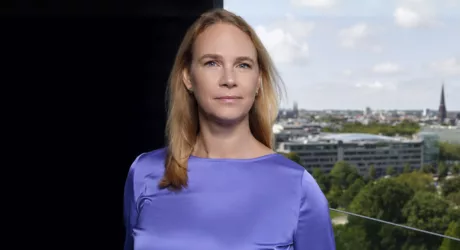Businesses and government authorities are exploring new technologies such as blockchain, smart contracts, the Internet of Things, smart cities, big data and cloud services. While offering significant social and commercial opportunities, these technologies also give rise to new legal questions. Answering these questions at the initial stage of the innovation process creates clarity, thus giving free rein to innovation.
The Legal Innovation Certificate offers clarity
Innovation projects on which we have advised are given the Legal Innovation Certificate. Tailored advisory processes from the Pels Rijcken Innovation Team ensure that laws and regulations are considered from day one of your innovation project.
Our approach is based on close involvement from the start of a project. We not only outline the legal frameworks but also provide creative input on how to embed legal requirements in the technological application. Our team of experts at Government Digitisation therefore receive ongoing training and education in IT and programming. This helps prevent the additional cost of having to rewrite programs later on and having to postpone the product launch.
The Legal Innovation Certificate consists of the following three phases:
Phase 1 – Legal impact analysis, action plan and budget
Intake: Before we can render any legal impact advice, we must first understand what the innovation actually involves and what the domain where it will be used looks like.
Impact scan: Not every innovation touches upon laws and regulations and not every domain where it will be used is subject to an equally strict regime. We make a scan of the laws and regulations applicable. Depending on the outcome, the new technology is assigned to the appropriate legal impact category: 'low', 'medium' or 'high'. This determines the scale of the remaining process and the scope of the engagement. We then discuss with the client how to draw up a specific action plan, working arrangements, and a budget.
Phase 2 – Implementation
Legal impact analysis: In this phase, we define the applicable legal framework, specifically the preconditions set by the Dutch and European legislatures. We assess this framework and apply it in full across multiple disciplines.
Embedding: Together with everyone involved, we embed the legal requirements in the technical structure during work sessions. For example: how do you incorporate the obligation to enable the removal of personal data into a blockchain? This way, we build a legally compliant technological application together.
Phase 3 – Report and Legal Innovation Certificate
Final report: We record the legal framework applicable and the advice and recommendations given in a final report, setting out to what extent any relevant laws and regulations have already been implemented and what aspects still require attention.
In addition, we identify the other legal aspects that may come into play during implementation, even if they do not ensue directly from the law. At the end of the advisory process, we issue the Legal Innovation Certificate. The Certificate serves to show that the laws and regulations reviewed, as stated in the advisory report, were taken into account during the development of the innovation. The Certificate is solely intended for the client. Third parties cannot derive any rights from it, if only because they have no knowledge of the underlying advisory report, which is not intended for them.
Maintenance: Laws and regulations as well as the application itself are in constant flux. With a maintenance contract, we advise proactively on changing legislation.
Optional legal services
Laws and regulations also affect related legal issues that are relevant during the development and implementation phases. Matters that must be properly covered from a legal perspective, in which we can provide a helping hand.

